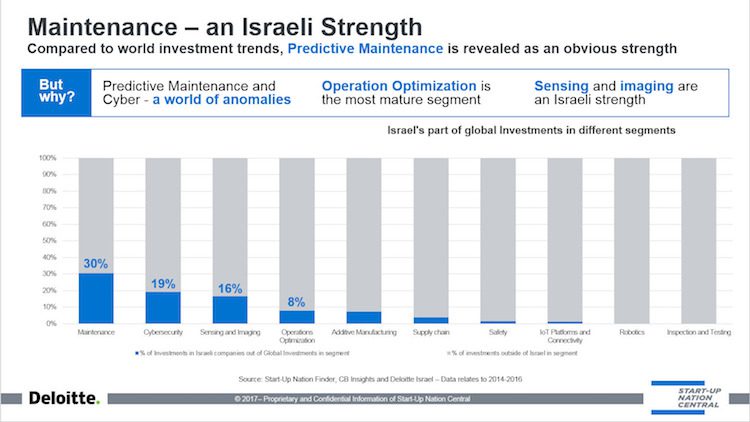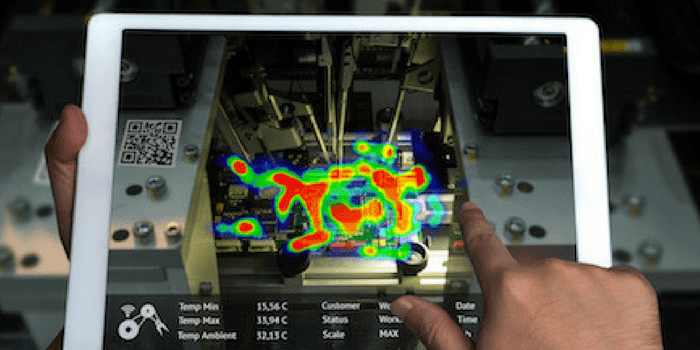Start-Up Nation Central, together with Deloitte Israel, has released a new report “The Value Proposition of Israel to Industry 4.0”. Click here to download your copy.
When you hear “industrial revolution”, the first association likely to spring to mind is the transition to new manufacturing processes during the late 18th century. These days, however, industrial revolution refers to Industry 4.0 – smart automation, and technologies aimed at connecting physical industrial assets with digital insights, while digitizing the entire chain of production. Industry 4.0 is mainly driven by the IIoT – the Industrial Internet of Things, largely based on sensor-related technology, and the ability to process the data collected rapidly and accurately.
The Times They Are A–Changin’
When you think about Israel, the image of heavy duty industry does not immediately spring to mind. Europe? Sure. Asia? Absolutely. Israel? Not so much. Think of it like this – Israel never had a very established presence in the automotive industry, yet suddenly Israel is the place where disruptive technological solutions for the auto industry are innovated, developed and created.
Over the last five years, nearly every original equipment manufacturer and Tier 1 automotive entity created one form or another of innovation activity in Israel. It’s less about the improvement of Israel’s automotive development capabilities, and more to do with the fact that the industry itself has significantly changed over the last twenty years. Cars today are no longer the hunks of plastic, metal and hand-stitched leather that they used to be, rather they have evolved into highly sophisticated computers on wheels.
This is also the story of industry.
How it Once Was
The traditional model of industrial sectors comprising mostly hardware and heavy materials and minimal software is changing. This dynamic has certain disadvantages, in that it requires many human operators, and most of the expenses budget goes on CAPEX. Over the last 15 years, software has been “eating”(credit Marc Andreessen) industries such as fintech, insurance, enterprise solutions, and mobile, and has eased the transition to using data for these sectors as an integral part of their business models. Industrial sectors, however, did not change as much. While creating innovation using data in sectors like fintech, insurance, etc., is a relatively straightforward proposition, utilizing data and analytics in traditional industry is a whole different ball game; optimizing a production line, or a power generator is a far more challenging prospect. This means that the ability to understand why things would go wrong, or furthermore, be able to report such occurrences, was nigh on impossible – as opposed to software-based technology where it is more apparent.
Undergoing Changes
Industry 4.0 is based on technological improvements, which make it increasingly easier to communicate with machines.
The declining costs of sensors, data analysis and transmission allow for easier data extraction. In turn, this means that the cost of drawing insights is also reduced, making everything easier.
Effectively communicating with machines allows them to let us know when something is going wrong with them, how they need to be fixed, best practices for their continued smooth operations, and so on. Not only does this help reduce costs, increase yield, reduce time to market, and analyze functions, it also opens up a brave new world of exciting new business models that could never have existed before.
So Where Does Israel Come In?
As industrial sectors become more focused on data and sensors than metal and plastic, so emerges Israel’s opportunity to really shine. Based on its expertise in the building blocks of the new industrial world, namely data analytics, machine learning, artificial intelligence and sensors, Israel is becoming an ideal candidate to advance Industry 4.0. The way in which Israel becomes the best fit for industry is less through industry itself, but rather through changing the fundamental essence of what defines an industry.
To gain a fuller understanding of where Israel’s strengths lie, we at Start-Up Nation Central divided Industry 4.0 into a range of various types of solutions, and examined which of them was receiving what level of funding. Additionally, Deloitte Israel used CB Insights’ database to map global Industry 4.0 start-ups. This allowed us to see how Israel fares in terms of VC funding compared to its global counterparts for different types of Industry 4.0 solutions.
 Here’s What We Found
Here’s What We Found
Israel has approximately 190 innovation companies that target industrial sectors. In 2014, Israel attracted 6.9% of global VC funding for Industry 4.0 start-ups, and for 2017, the projected figure is 11%. Not only does this place Israel second in the world after the US for attracting VC funding for Industry 4.0 start-ups, but it also clearly indicates that, as a nation, Israel is an emerging force and power in this industry.
A new report from Start-Up Nation Central and Deloitte Israel, The Value Proposition of Israel to Industry 4.0 indicates the following:
- Of the global VC funding for predictive maintenance solutions, 30% goes to Israeli companies.
- For global cybersecurity solutions, 19% goes to Israeli companies.
- For global sensing and imaging solutions, 16% goes to Israeli companies.
- And for global operational optimization solutions, 8% goes to Israeli companies.
Statistics of Unusual Size
These statistics may seem unusual and even difficult to believe. Well, partly, anyway. Israel is the most heavily funded ecosystem in the world per capita, in terms of VC funding. Plus, Israel does have a well-established foundation in the cybersecurity industry, as well as in both sensing and imaging – the statistics for which are far easier to accept. But maintenance? Less so.
One of the main abilities needed to create a good predictive maintenance solution is the ability to sift through a lot of data, to understand what is relevant, what is not, and how to best respond to the conclusions arrived at from the data insights. A vital element of the process is the ability to keep the predictive anomalies false alarm rate to a minimum. Oddly enough, these are also the same technological foundations for creating an effective cybersecurity solution.
Sharing the Same Foundation
The fact that both cybersecurity and predictive maintenance solutions are based on the same technological foundation allows for essential spill-over from one sector to the other – which is one of the main reasons why Israel is so well-funded in this area, and also why there is such an abundance of trust in Israeli companies that create effective predictive maintenance solutions.
Predictive maintenance also attracts a great deal of interest because it is easy to understand the challenge, and the ROI is clear – reducing downtime by preventing machine malfunctions saves money. The problem is easy to identify, therefore the reason why a solution is required is clear. Given the straightforward “what, where, and why” nature of predictive maintenance, combined with the fact that the modus operandi of the Israeli entrepreneur is problem-solving (i.e. handling the “how”), as soon as a problem is identified, entrepreneurs will be energized to solve it.
The Value Proposition
The value proposition that Israel offers is an even mix of the technological foundations of cybersecurity, and sensing and imaging, combined with the new set of emerging problems that the new industrial world presents to the ecosystem. Given Israel’s experience in working with industrial corporates, Start-Up Nation Central is highly aware that the best manner in which to engage a vibrant community of entrepreneurs is to challenge them with genuine problems of real world industries, such as those documented above. And this is exactly what Israel does.
Click here to download The Value Proposition of Israel to Industry 4.0 report, by Start-Up Nation Central and Deloitte Israel.
